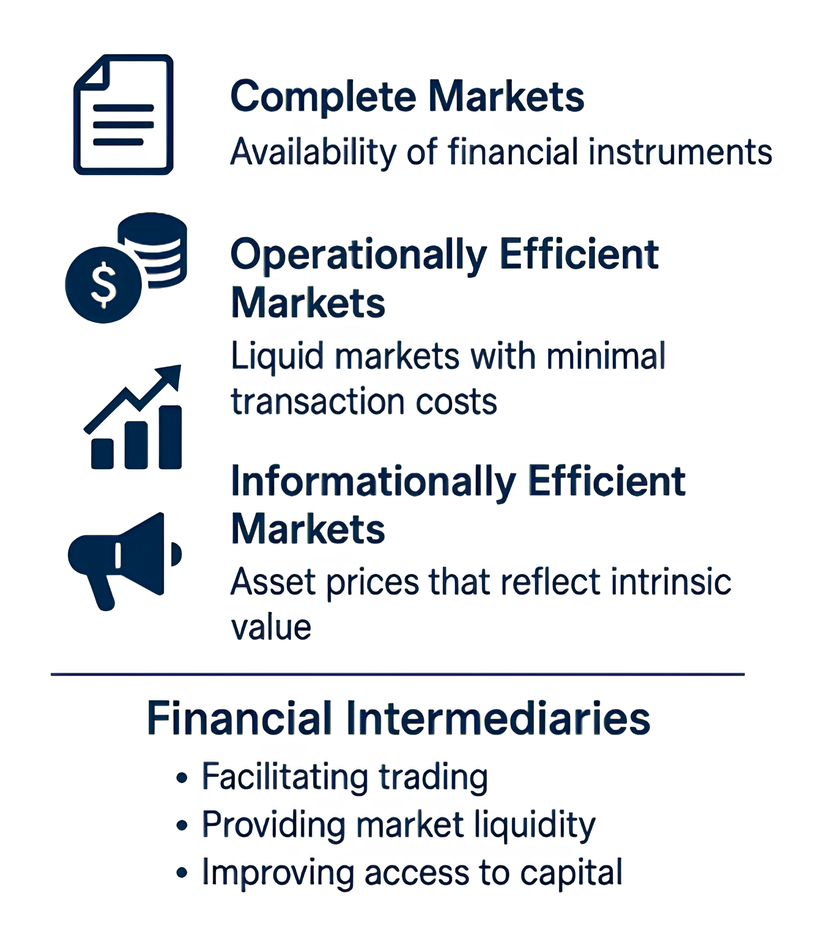A Well-Functioning Financial System
A well-functioning financial system efficiently allocates capital, manages risk, and supports economic growth. Understanding the financial system definition is key to recognizing how market structures, intermediaries, and efficiency work together to ensure reliable, transparent transactions.
Join over 2 million professionals who advanced their finance careers with 365. Learn from instructors who have worked at Morgan Stanley, HSBC, PwC, and Coca-Cola and master accounting, financial analysis, investment banking, financial modeling, and more.
Start for FreeBefore addressing the characteristics of a high-performing financial system, it’s essential to clarify the financial system definition. In the world of investing and finance, effectiveness is more than just doing things right—it’s about doing the right things in the right way. A financial system that truly supports economic growth and stability must be efficient, reliable, and aligned with the needs of its participants. Let’s explore the key traits that define such a system.
Financial Systems in Capital Allocation
In well-functioning financial systems, investors can efficiently fund entrepreneurs seeking capital to support their business ideas. Risks that may be too great for a single entrepreneur to bear can be distributed to others who are better equipped to manage them. This ensures that valuable investment opportunities are not lost or misallocated. Crucially, these transactions often occur between strangers—expanding the scope for capital formation and risk-sharing.
Conversely, when the financial system is weak or disorganized, capital is not directed to the businesses that need it most. A clear financial system definition underscores the importance of structure and reliability; without it, transactions are limited, and reliable counterparties may be unavailable to uphold agreements. These shortcomings lead to poor capital allocation and reduced production efficiency.
Why do we need a well-functioning financial system?
In simple terms, financiers expect a system that operates smoothly to support key market participants.
- Investors should be able to save money with fair returns relative to risk.
- Borrowers must have access to the funds they need.
- Hedgers need the ability to manage and offset the risks they face.
- Traders ought to be able to exchange currencies, commodities, and other assets efficiently.
This is an ideal environment for anyone operating in financial markets. But achieving this functionality requires certain conditions, beginning with a clear financial system definition. One of the most crucial is market completeness—the market must offer a wide range of assets and contracts that allow participants to address their financial needs effectively.
But that’s only part of the equation.
A truly well-functioning financial system must also control costs and ensure timely access to information. Based on these criteria, we define two types of market efficiency:
- Operational efficiency refers to low trading costs.
- Informational efficiency means asset prices reflect all available information about their actual or intrinsic value.
These two forms of efficiency are closely linked. When trading costs are low, it’s more straightforward and worthwhile for traders to act on new information, making prices more informative. Conversely, when trading is expensive, fewer resources are dedicated to information gathering—leading to less accurate pricing.
Why is informational efficiency so important?
Informational efficiency matters because it ensures that markets function based on accurate and timely disclosures from companies and governments. According to the financial system definition, these disclosures enable investors to assess the actual value of securities.
When market participants are well-informed, they tend to buy undervalued assets (driving prices up) and sell overvalued assets (pushing prices down). These actions help align market prices with the fundamental value of securities.
At its core, informational efficiency is vital because it allows capital to be allocated to its most productive uses—a key driver of economic growth and national prosperity. When markets allocate resources effectively, we say they are allocational efficient.
Conversely, resources are squandered in economies where capital is not directed toward its most productive applications. This inefficiency often characterizes some of the world’s poorest nations.
Key Pillars of a Well-Functioning Financial System
A well-functioning financial system rests on several foundational elements:

A robust financial system also depends heavily on financial intermediaries. These institutions play a central role by:
- Facilitating trading through the organization of venues where buyers and sellers meet
- Providing market liquidity—enabling smoother and faster transactions
- Operating clearinghouses—ensuring trades are settled securely and efficiently
- Improving access to capital by directly linking borrowers with investors (e.g., through banks) or by securitizing assets into tradable instruments to reduce funding costs and broaden investment opportunities
Together, these elements ensure that the financial system can effectively serve its essential economic functions.
The Building Blocks of a Healthy Financial System
A well-functioning financial system depends on foundational pillars: complete markets, operational efficiency, and informational efficiency—all supported by timely and transparent disclosures. By the financial system definition, these components ensure that capital flows to its most productive uses, fostering economic growth and societal welfare. Crucially, none of this is possible without financial intermediaries, who provide the infrastructure, liquidity, and access necessary for markets to operate effectively. Together, these elements create a financial environment that benefits investors, institutions, and entire economies.
To deepen your understanding of these core principles and how they shape global finance, consider joining the 365 Financial Analyst platform for expert-led courses and real-world insights.
